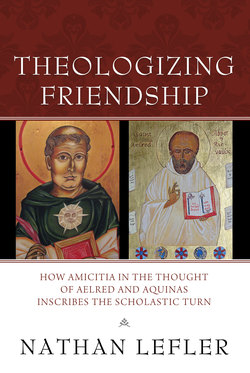Читать книгу Theologizing Friendship - Nathan Sumner Lefler - Страница 6
На сайте Литреса книга снята с продажи.
Acknowledgments
ОглавлениеI would like to thank several people for their especial support in bringing to completion the original form of this book, namely, my dissertation. First, I must acknowledge the faithful work of my director, Father James Wiseman, O.S.B., whose unwavering consistency and extraordinary efficiency made the project far less onerous than it might have been. I would also like to thank my readers: Father Regis Armstrong, O.F.M.Cap., for his willingness to read my dissertation, but also and particularly for one of the finest seminars in medieval theology I have had the privilege of attending, and Father Raymond Studzinski, for stepping into the proverbial breach. I should add that Father Studzinski’s recent book, Reading to Live: The Evolving Practice of Lectio Divina, has provided welcome confirmation of part of the background argument for my opening chapter. To these older debts of gratitude I must now append those accrued through the process of editing and preparing my manuscript for publication as a book. Above all in this latter category, I must thank Father Austin Murphy, OSB, Abbot of St. Procopius Abbey and old friend, for his willingness to read my dissertation and write a foreword, in the midst of overseeing a large Benedictine community and its numerous adjoining apostolates. Next, I am deeply grateful to Mary Ann Smith, whose sharp eye and editorial prowess when thrown suddenly into the breach enabled her quickly and unerringly to accomplish what would have taken me months of fretting and probably years off my life. I am also grateful to Patricia Mecadon for her professional typesetting skills. I would like to acknowledge as well the spiritual and emotional support of my parents, Charles and Susan Lefler, who have never doubted my abilities or my heart, no matter how frequent and great have been my own mistrust of both. Finally, I would like to acknowledge my wife, Annie, for whom this work in many ways has been principally executed, and without whom it would never have taken the shape it has.
